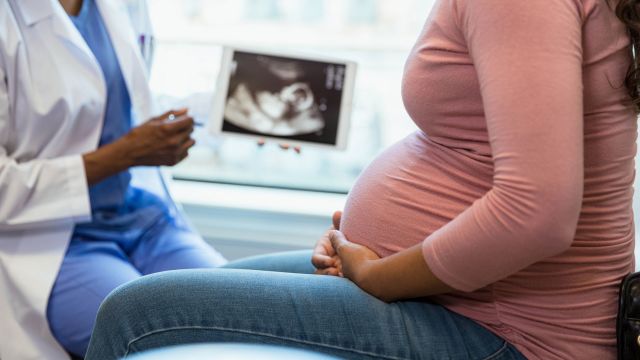Updated on October 29, 2024.
Health care providers (HCPs) usually check a pregnant person's blood pressure and urine at every appointment. There’s a good reason for this: They’re looking for signs of preeclampsia, a pregnancy complication that can have serious long-term health effects for both the parent and the fetus.
Signs of the condition, which affects around 3.4 percent of pregnancies in the United States, include higher-than-normal blood pressure during pregnancy or after giving birth; it also can involve high levels of protein in urine and a decrease in blood platelets (cells that help blood to form clots).
Preeclampsia most often occurs after 20 weeks of pregnancy, about halfway through the second trimester (the middle three months of pregnancy). Without proper medical attention, it can lead to serious complications, increasing a pregnant person’s risk of organ damage and seizures, and potentially leading to stillbirth.
Preeclampsia can also begin after the parent has delivered the baby—this is known as postpartum preeclampsia, and it usually happens within 48 hours of delivery, though it can take a few weeks to appear. We spoke with Jennifer Guggenheim, MD, an OBGYN with Presbyterian/St. Luke's Medical Center in Denver, CO, to learn more about preeclampsia's signs, risks and causes, as well as the treatment options that can lead to a safe delivery and healthy parent and baby.
Signs of preeclampsia
One reason it’s so important to get your blood pressure checked frequently during pregnancy: Preeclampsia can develop without any symptoms at all, and it may only be detected during routine screenings. Preeclampsia without symptoms is often less severe than cases with symptoms, but even a mild case should be closely monitored by your HCP in case it gets worse.
This is why your HCP will track your blood pressure throughout your pregnancy. Some numbers to keep in mind: A reading that exceeds 140/90 (mm Hg) on two different occasions at least four hours apart is considered high and requires attention. Even if your blood pressure is higher than 120/80 mm Hg your HCP may want to watch you closely for any further changes.
In addition to high blood pressure, other signs of preeclampsia can include:
- Severe headaches
- Vision changes, including blurred vision and light sensitivity
- Nausea and vomiting
- Difficulty breathing
- Swelling of the arms, legs, hands, feet and face
- Confusion
- Abdominal pain
- Rash
"For patients who have any of these symptoms, it's worth calling their physician's office," Dr. Guggenheim says. "It's so much better to call with a concern than to miss something and end up in trouble."
Causes or preeclampsia
"It's not totally clear why some people develop preeclampsia," Guggenheim says. The cause may have to do with improper development of the placenta, the organ responsible for providing a growing fetus with blood, oxygen and nutrients. When the new blood vessels that develop during pregnancy to supply the placenta are too narrow or don't function properly, it can affect blood pressure regulation in the pregnant person.
Risk factors for preeclampsia
Even though we don’t know the exact cause of preeclampsia, we do know that there are several factors that can make it more likely for a pregnant person to develop the condition. Many of those risk factors are unmodifiable, meaning there isn't much you can do to prevent them, but it may be helpful to be aware of them:
- First pregnancy
- Family history of preeclampsia
- Older than age 40
- African-American descent
- Being pregnant with twins, triplets, or more
There are also range of risk factors that may be within your control. "If you already have hypertension [high blood pressure],” Guggenheim says, “you should get it under control prior to pregnancy. If you’re overweight, weight loss would be advised."
It may not be possible to reverse certain conditions but managing them is a crucial step. If you plan to get pregnant, speak with your HCP about existing conditions such as obesity and high blood pressure, as well as kidney disease and diabetes (high blood sugar levels).
Complications of preeclampsia
Preeclampsia poses risks to the pregnant person both before and after delivery. Although 75 percent of cases of preeclampsia are considered mild and the condition typically goes away six weeks after childbirth, there is still the potential for long-term complications, including brain, kidney and liver damage, organ failure, stroke and heart disease. Eclampsia, which is a condition that causes seizures, is another potential complication of preeclampsia.
Although it’s very rare, preeclampsia-related death is a risk; it is responsible for an estimated 10 to 15 percent of maternal deaths worldwide.
The fetus faces risks, too, including impaired growth, preterm delivery and even death. Infants born to people with preeclampsia may be at an increased risk of blindness, epilepsy (a brain condition that causes seizures), learning differences and cerebral palsy (a condition that causes problems with movement, posture, and balance).
Treatments for preeclampsia
The most effective way to reduce the risks of preeclampsia to both parent and fetus is to deliver the baby. If you’ve reached at least 37 weeks of pregnancy without serious symptoms of preeclampsia, your HCP may induce delivery—though if symptoms are severe, your HCP may recommend induction as early as 34 weeks. Preeclampsia typically goes away in the days and weeks following delivery.
If the condition is detected early in the pregnancy, however, delivery may not be possible.
"Preeclampsia with severe features is managed differently," Guggenheim explains. "Those patients are typically hospitalized, and we would deliver them when the risks outweigh the benefits of keeping the patient pregnant."
If your HCP considers early delivery to be unsafe, they may recommend bed rest or hospitalization, so the pregnancy can be monitored closely. They may also prescribe medications such as blood-pressure lowering drugs, anticonvulsant medicine to prevent seizures and corticosteroids to improve liver and platelet function and to mature the lungs of the fetus.
Post-delivery risks of preeclampsia
Although rare, new parents can develop postpartum preeclampsia within days of delivery or even up to six weeks or more after giving birth. This can occur even without high blood pressure during pregnancy. If you have recently given birth and experience severe headaches, changes in vision or vision loss, pain in the upper belly, or decreased urination, call 911 or notify your HCP immediately.
Postpartum preeclampsia and preeclampsia that persists after giving birth can pose serious risks to you and your baby. It requires immediate treatment to decrease the risk of seizures, organ damage and stroke. The condition can be treated with the same medications as preeclampsia during pregnancy, which prevent seizures and lower blood pressure. Your HCP may also recommend more frequent blood pressure monitoring.




